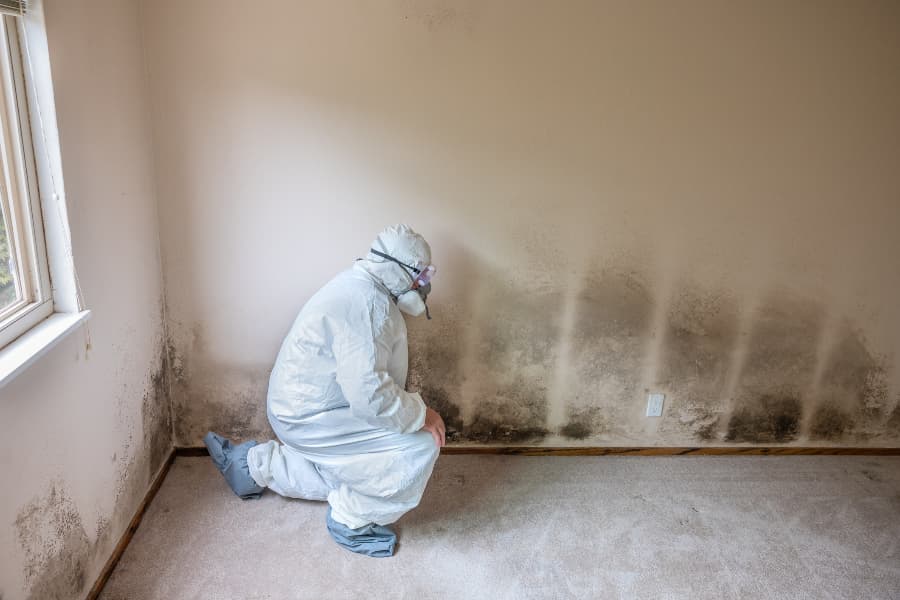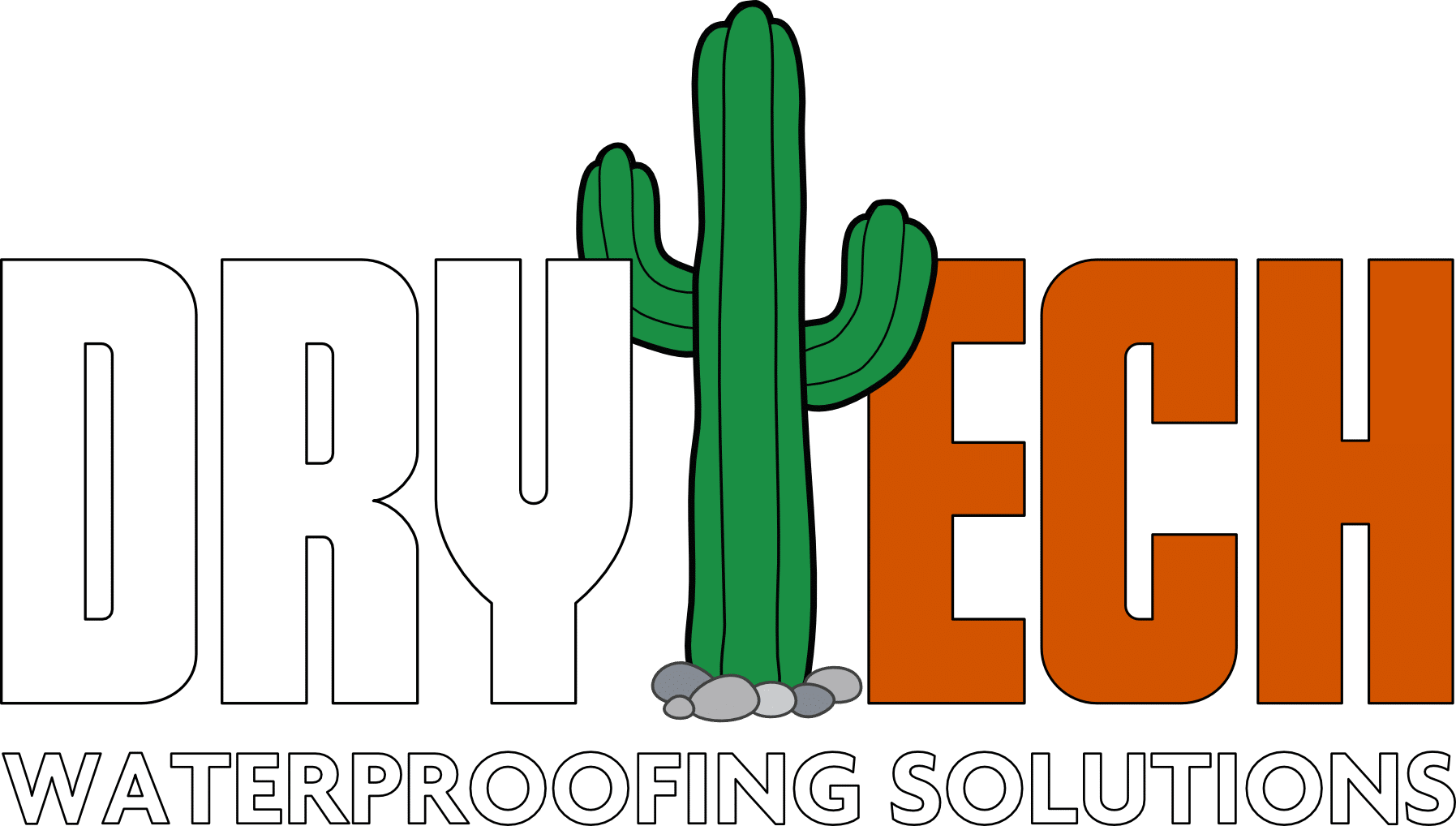Home / The Most Common Basement Molds in Pennsylvania, New Jersey, and Delaware
The Most Common Basement Molds in Pennsylvania, New Jersey, and Delaware
Mold growth in basements can negatively impact air quality and lead to costly home repairs and potentially harmful health effects. Keeping a basement clean and dry from mold and allergens is the best way to keep you and your family safe from these negative consequences. Dry Tech Waterproofing serves households in Pennsylvania, New Jersey, and Delaware with mold remediation services. Here, we discuss the common types of molds in basements in PA, NJ, and DE.

Understanding Mold in Basements
Mold is a type of fungus that grows in multicellular structures called hyphae. These organisms reproduce by releasing spores into the air. Mold thrives in moist, dark environments that have limited sunlight and a potential for dampness. Therefore, basements are particularly vulnerable to mold growth because of their location below ground level and their tendency to trap moisture. Several factors contribute to these issues, such as:
- Water intrusion: Cracks in foundation walls, poor drainage, or heavy rainfall can lead to water seeping into basements.
- High humidity: Basements often have limited light and ventilation, causing humidity levels to rise, especially in warmer months.
- Condensation: Cool basement walls can cause moisture in the air to condense, particularly around pipes and windows.
- Plumbing leaks: Hidden or slow leaks from pipes can go unnoticed and create ideal conditions for mold.
- Poor insulation: Inadequate insulation can lead to temperature imbalances and moisture buildup.
Once mold is established, it can spread quickly, damaging surfaces and releasing allergens and toxins that affect indoor air quality, cause lung damage, and impact people with autoimmune conditions. Mold growing in basements can also trigger various health issues, including respiratory problems, allergic reactions, fatigue, and headaches.
Common Types of Basement Mold Found in PA, NJ, and DE
Pennsylvania, New Jersey, and Delaware are areas that experience humid, warm summers and cold, damp winters. Therefore, they can also experience mold growth, especially in basements. Some of the most common types of mold in these areas include:
Black Mold
Black mold is one of the most well-known and feared types of molds because of its toxic potential. It appears as dark greenish or jet-black patches with a wet texture when actively growing. It often develops on materials with cellulose content, such as drywall, wood, and paper products. It may also be found growing behind walls or under flooring. Black mold thrives in moist environments and spreads in poorly ventilated basements and areas with high humidity. Some potential health hazards of black mold include:
- Persistent coughing and sneezing
- Chronic fatigue and headaches
- Skin rashes
- Worsening of asthma or other respiratory conditions
- Neurological effects
Because of its toxic nature, black mold should be professionally removed, and the source of moisture addressed immediately.
Aspergillus
Aspergillus is a common mold that’s found in basements. It appears as green, yellow, or gray patches with a powdery or fuzzy texture. It typically grows on damp walls, insulation, and organic materials like wood and paper. It can spread rapidly, depending on the moisture level and temperature. It thrives in warm, humid conditions and can colonize on surfaces quickly. Some of the health issues it can cause include:
- Allergic reactions: Sneezing, coughing, and skin irritation are common with this type of mold.
- Respiratory infections: In people with weakened immune systems, this type of mold can cause sinus and lung infections.
- Asthma aggravation: Exposure can worsen asthma symptoms and lead to lung issues.
Cladosporium
Cladosporium is a widespread mold that appears as greenish, brown, or black patches with a powdery texture. It commonly grows on organic materials like wood and drywall, as well as on carpets and fabrics. Cladosporium appears in damp, poorly ventilated basements. It spreads at a moderate rate, particularly in water-damaged basements or humid areas. Cladosporium is an allergenic mold and can cause:
- Asthma flare-ups
- Allergic rhinitis
- Skin and eye irritation
- Sinus congestion and coughing
Tackling Mold in Your Basement
Early detection is key to preventing mold from spreading and causing damage to your home and health. Some signs that mold may be present within your basement include:
- An earthy or musty smell
- Visible mold that’s black, green, yellow, or white
- Signs of moisture or water damage like stains, peeling paint, or warping
When it comes to mold in your basement, DIY solutions may offer temporary relief, but professional mold remediation ensures long-term protection and safety. Our experts at Dry Tech Waterproofing offer thorough inspections using specialized equipment for detection and safe removal of mold spores and containment to prevent health issues. We also address the root cause of moisture, such as fixing leaks, improving drainage, and installing moisture barriers.
Work With Us to Remove Various Types of Molds in Your Basement
Have you noticed signs of these basement mold types in your home? Trust Dry Tech Waterproofing, a trusted name in mold remediation and basement waterproofing across Pennsylvania, New Jersey, and Delaware. Our services are designed to eliminate mold and prevent its return by addressing underlying moisture issues.
In addition, we offer free estimates, lifetime warranties, and 0% financing on our services. Our team also performs hydrostatic pressure tests and perc tests. We also utilize the best technology available, helping us to develop a strong reputation throughout the PA tri-state area. To learn more about detecting or remediating mold in your basement, contact us today.
